Montessori Parenting Style - Your Comprehensive Guide to Raise an Amazing Child
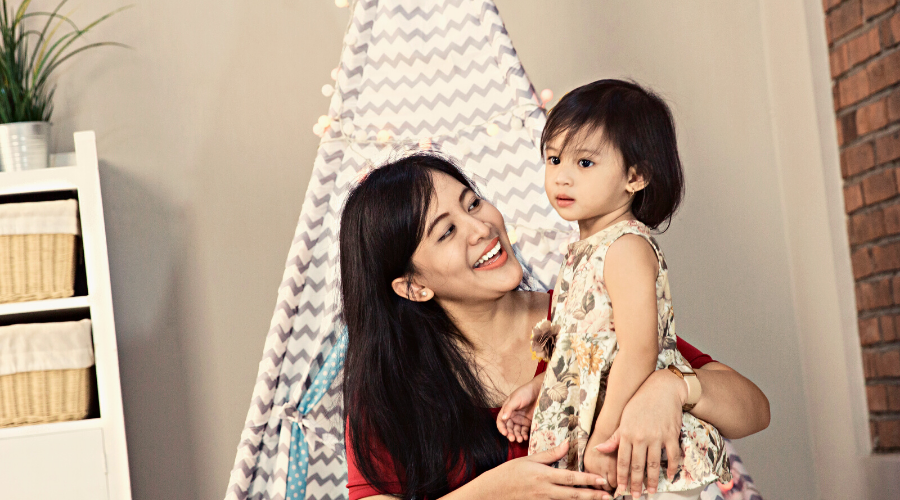
Published Date: 09/01/21
How you can incorporate Montessori parenting into your home
A boy, age two. He independently goes to his room and walks up to his toddler-sized dresser. He pulls out a T-shirt, a pair of shorts, and socks for himself. He lays the clothes on the bed and starts dressing up. An independent boy with practical life skills gets himself ready to leave the house.
Could this happen? It can and it does for many who practice Montessori parenting.
-----------------------------------------
RELATED POST: Montessori vs Traditional Preschool: Which is Better?
-----------------------------------------
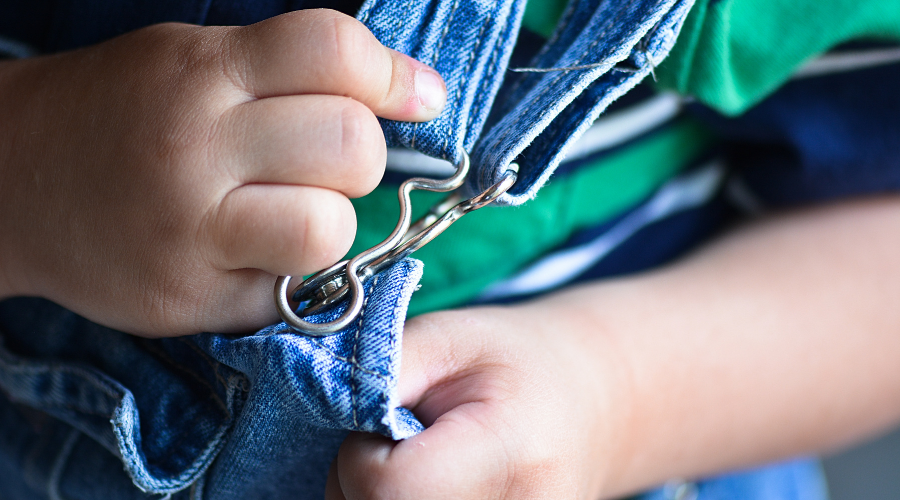
A toddler dresses themself when Montessori is practiced at home.
Getting to know Montessori
The Montessori philosophy was pioneered by Dr. Maria Montessori in the early 1900s. Montessori methods emphasize independence, communication, positive discipline, respect for children, and allowing children to work at their own pace.
As the focus is on development of children as a whole, it makes sense that families have taken the Montessori philosophy out of the classroom and adopted it at home by becoming a Montessori parent. And for many, it goes beyond parenting - Montessori becomes a lifestyle.
What is Montessori Parenting?
“Never help a child with a task at which he feels he can succeed” – Dr. Montessori.
This quote gets to the heart of Montessori ideals.
Children struggle as they learn to complete new tasks - adults do too. But often adults are in a rush and young children are slow so a parent steps in saying, "Here let me help," or "I'll just do it."
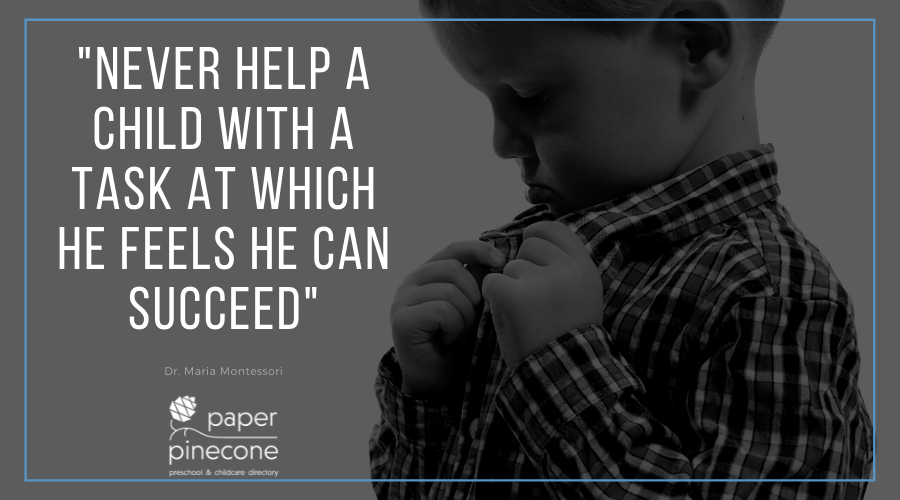
With Montessori parenting, children are allowed to practice these skills and develop them at their own pace, in their own time, uninterrupted. Parents don't interfere with children's natural desire to learn. Instead, kids are encouraged to complete tasks on their own, even if it takes a little longer.
That doesn't mean that parents don't teach their kids. Just like in the Montessori classroom where teachers are called guides, a Montessori parent becomes the guide, fostering their child's natural abilities, leading by example, and instilling a sense of self.
-----------------------------------------
RELATED POST: THE PROS AND CONS OF MONTESSORI
-----------------------------------------
What is Montessori at Home?
Did you know your 1–2-year-old can put on their own shoes if given the required time and space?
But how often do we do that? As parents, our instincts tell us to put their shoes own – not help them, not guide them, but actually put them on with our own hands. We're in a rush and this way we don’t end up ‘wasting’ any time. That said, we rob them of the opportunity to learn things on their own, at their own pace, and feel more independent.
Montessori at home is all about respecting the potential children to develop their own instinct and tendencies and act on them while at home. This eventually helps them become confident in themselves, while also helping them understand the way cause and effect works.
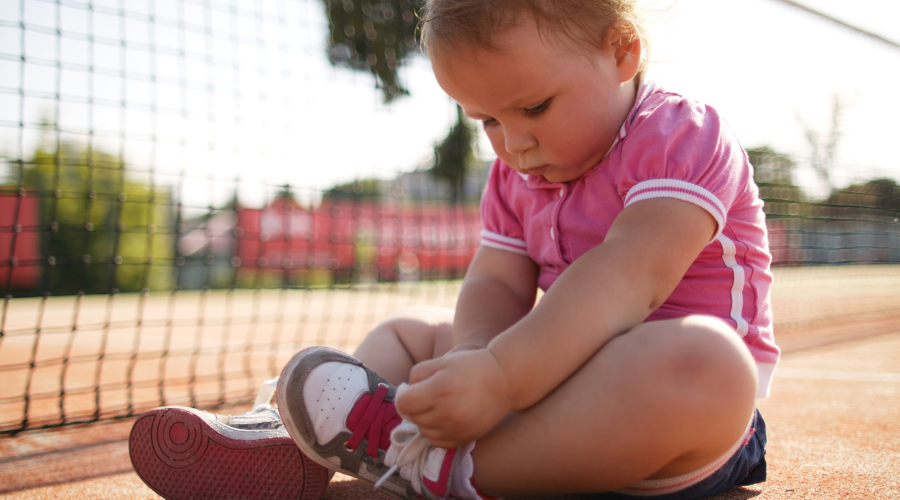
Montessori parenting is built on respect for the child and giving the the time and space they need to do things on their own.
Your Guide to the Montessori Parenting Style
Adopting the Montessori style of parenting will need some due diligence on your end, and will also require a fair amount of patience, all with an open mind.
We inform you beforehand that this style of parenting can and will encourage you to put your own thoughts and ideas at bay and adopt a style that is freer than you might be comfortable with right now!
That said, let's take a brief look at some of the basics of this style of parenting and education
-----------------------------------------
RELATED POST: HOW TO RAISE RESILIENT CHILDREN
-----------------------------------------
Step 1 – Respect Your Child
This is one of the first Montessori rules for parents. Being a Montessori mom or dad means you'll show a tremendous amount of respect towards your toddler. The simple idea here is that the child should be respected and should feel respected.
- Children are autonomous people with their own thoughts
- Kids are inherently capable beings
- Children should not be ignored simply because they're children
- Children have ownership over their bodies
How can you do that?
You can begin by listening to the views and opinions of your toddler, and by honoring them to the maximum extent possible. That doesn't mean saying 'yes' to everything or giving into their demands. It does mean acknowledging them when they're speaking to you and acknowledging their wants and needs, even if they can't or shouldn't be accommodated.
Yet another way of showing respect to your little ones is by NOT talking down to them or babying them by using simpler, cuter, or even loosely pronounced words for their sake. You need to give them credit for knowing their vocabulary and should use complex words and sentences. This will help enhance their linguistic skills and will enable them to communicate more efficiently.
Respecting your child also means apologizing to them when you’re wrong, or when you have been unable to stay true to your word. Not only does it demonstrate respect, but it models the behavior you want to see.
Another way to demonstrate respect is by not forcing physical affection. Empower kids to choose if they want to hug or kiss you or anyone else and stop tickling, hugging, and touching when they tell you to.

With Montessori parenting, children are giving the opportunity to explore the world around them.
Step 2 – Offer Ample Space and Loosen the Boundaries
With Montessori parenting, it's crucial that a child is allowed to explore the world around them on their own. To do so, give them plenty of space so that their actions and movements are as unrestricted as possible in your home. Place toys, books, and related materials on low shelves so children can access on their own.
Rather than always being involved in their playtime, give them the freedom to play the games or with toys that they prefer. It's okay to say that you can't play at the moment. When you do play with them, allow them to lead and avoid directing.
While playing alone, you'll, of course, need to keep an eye on them since most kids don’t respect boundaries at all times, and if neglected can go in the wrong direction either physically or emotionally, and in some cases both!
It's is also important to give them a clear idea of their boundaries, however loose and extended they might be. This will ensure that the child will himself understands the importance of self-control.
-----------------------------------------
RELATED CONTENT: HOW TO ENCOURAGE INDEPENDENT PLAY
-----------------------------------------
Step 3 - Adapt Your Home to Accommodate Your Montessori children
When raising a Montessori child, it is essential that you give adequate autonomy to your child. This means if they want to imitate you, and they will, then you must let them do so.
For example, if your little one wants to fill their own glass of water and drink it, let them. This also means providing them access to cups and water so they can do so without your assistance.
Not only will this help in the development of cognitive skills but will also instill a sense of confidence in them, which can only come if you truly let them do these small chores by themselves.
Be warned, their attempts may be messy, and that is completely alright. With a little patience, you can guide them to be better with each passing day, plus it's an opportunity to teach them to clean up the messes they make.
Remember, if your home environment is conducive to their participation in day-to-day activities, they will be more open to adapting to newer habits and enjoying greater freedom as time goes by.
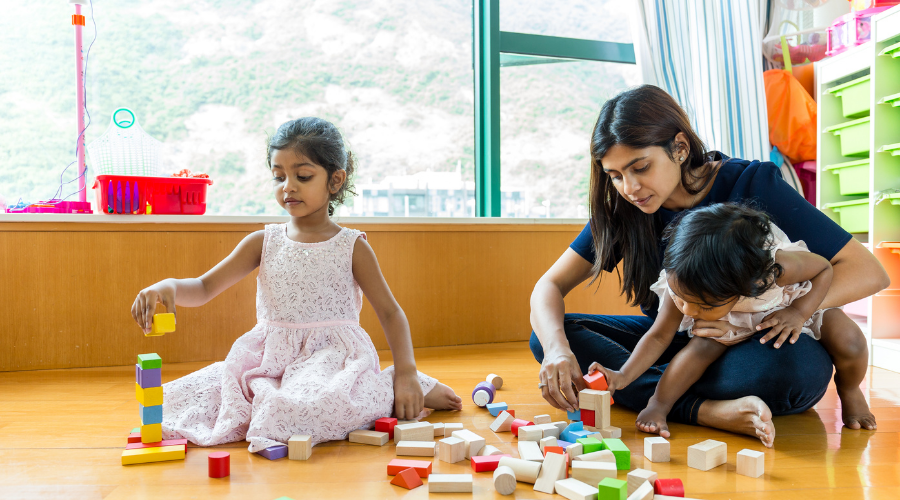
Create your home environment using Montessori materials and toys.
Step 4 - Teach Them About Cause and Effect
Since you are giving them the freedom to exercise their own choices, and do their own chores, they are bound to make some mistakes on the way.
As tempted as you may feel to stop this from happening, let these mistakes occur. When they do occur, clean up together and ask your child how they think the mistake can be avoided next time. This will enable them to understand the cause and effect between various actions and prepare them to not make the same mistake again.
Furthermore, this will facilitate better decision-making as well as restraint from a very young age!
Step 5 - Observe and Adapt
Regardless of the number of tips and tricks we offer, the Montessori way of raising a child is all about letting a child be himself/herself. The more you observe them, the better idea you will have of their likes, dislikes, and inclinations.
For instance, your toddler may love to play with his piano but doesn’t show any interest in the set of Legos you bought. Based on this, you can encourage him to try and enjoy musical instruments, and see if they find something that they can truly pursue.
Similarly, you can keep adapting your home environment and your parenting styles based on the needs and preferences of your loved one.
This doesn't mean you shouldn't encourage trying new things and certainly preferences may change over time. But, follow your child's lead and don't force your preferences on them.
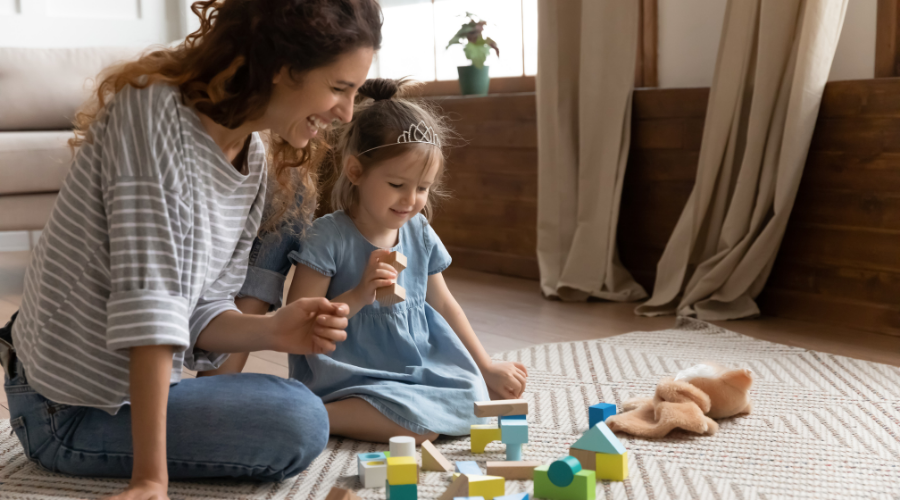
Getting extended family on board helps provide a consistent environment for your child and helps ensure gifts are aligned with your philosophy.
Step 6 – Involve Other Members of Your Family
To make sure that the Montessori approach is as effective as it can be, you can try to involve the child’s grandparents, uncles, and aunts in the activities you undertake.
Try explaining your approach, so when they interact with your child, they do so in a similiar way.
This will create a much more conducive environment for the child when relatives are visiting or your child is in their home.
Step 7 – Enroll the Child in a Montessori School
If there's an opportunity, enroll your child in a Montessori school. This will ensure that the approach they are getting to learning, education, and life, on the whole, are the same, both at home and at school.
Of course, when you do so, make sure to let the teacher know about the progress you’ve made with this approach, and share your observations to date. This will enable the teacher to better adapt their teaching methodologies to your little one’s interests.
Start your search on Paper Pinecone, the #1 most trusted preschool directory, to find a Montessori preschool near you.
-----------------------------------------
RELATED CONTENT: THE BENEFITS OF MIXED AGE PRESCHOOL CLASSES
-----------------------------------------
Final Thoughts
When parents practice Montessori at home, they're empowering their children to have some autonomy over their lives. Montessori parenting can help kids explore and learn as they grow, develop independence, and may help to minimize behavioral problems.
FAQs On Montessori Parenting Style
1. What are the basics of the Montessori style?
Montessori is a style of education that is focused on the physical, emotional, mental, spiritual, and social development of the child. It emphasizes the creation of a child-centered environment, wherein the child is given the freedom to choose work based on their developmental needs and interests.
2. What parenting style is Montessori?
Montessori parenting can be defined as a relaxed parenting approach in which the toddlers are given ample freedom to play, work, study and learn. They are not punished for bending the rules and are respected for being themselves.
3. What age is best to start Montessori?
As Montessori programs are three year cycles, you'll want to start at the beginning of the cycle, which is typically around age 2.5 or 3 years old. You may occasionally, you'll find a Montessori program geared at infants and younger toddlers, and you can start Montessori at home from birth!
4. What are the five principles of the Montessori method?
The Five Principles of the Montessori approach are:
Principle 1: Respect for the Child
Principle 2: The Absorbent Mind
Principle 3: Sensitive Periods
Principle 4: The Prepared Environment
Principle 5: Auto-education
Paper Pinecone is the #1 most trusted childcare directory giving parents access to the best preschools and best daycares near you. Parents always search free and childcare providers always list free. Send inquiries about the best daycares and preschools to [email protected].
- stacey's blog
- Log in or register to post comments
